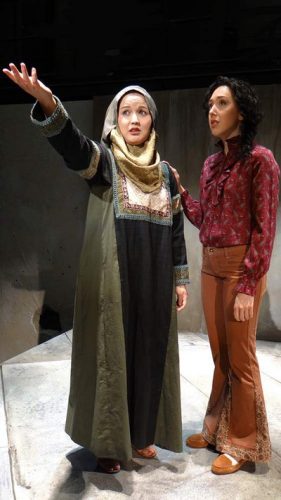
Written in 2003, Scorched is by Lebanese-Canadian writer Wajdi Mouawad. Opening Thursday, March 3, University of Oregon theater arts instructor Michael Najjar directs the play at University Theatre.
“Scorched is about a pair of twins who attend the reading of their mother’s will,” Najjar explains. “They are charged by their mother to find their father and brother they never knew they had.”
If the siblings don’t follow this request, they are not allowed to bury their mother properly.
“The onus is on them to either meet this challenge or not,” Najjar continues. In doing so, the twins go on a journey back in time through a series of flashbacks as well as an actual journey to their mother’s home country, where they learn more about what their mother suffered during a civil war.
Najjar says the themes of war and refugees resonated with his family history. “My own family fled Lebanon,” Najjar says. “My wife’s family fled in the civil war as well.”
Along with this personal connection to story, Najjar says he hopes the play helps to humanize the tragic headlines we see seemingly on a daily basis.
“On the news you’ll hear 24 people died today, 50 people died today, 100 people died today, and these number float around,” he says. “A play like this humanizes the story. You’re forced to empathize with people who have been in wars.”
“I think that is the power of the theater,” Najjar says. “People are channeling those experiences directly in front of the audience. This kind of a play can bring a kind of awareness to the situation. I hope the play will resonate on a much, much deeper level, especially given all the stories we hear every day about the refugee crisis.”
“The point is for us to really take a moment and explore these people’s lives and try to speak for them,” Najjar says. “The ghosts of the dead are speaking.”
Najjar warns that, although the play is very serious, it contains elements of humor as well as a love story. “Any good piece of art has to focus on the light and the dark,” Najjar says.
And he adds that one of Scorched’s most important messages comes from the mother, speaking to her children from beyond the grave.
“Their lives began in two different ways,” Najjar says of the play’s sibling leads. “One was in horror and one was in love. She tells them it’s really up to them. It’s up to them to choose which of those stories they want to believe in.”
Here Najjar quotes from the script, recalling that the mother asks, “‘Where does your story begin? At your birth? Then it begins in horror. At your father’s birth? Then it is a beautiful love story. When they ask you to tell your story, tell them your story goes back to the day when a young girl went back to her native village to engrave her grandmother’s name on a gravestone.’”
“It really asks us, as audience members, what do we think of as our origin stories?” Najjar says. “If we have a choice, can we look at a different starting point? The play asks the audience to take a deep personal journey.”
Scorched runs March 3-13 at UO’s Hope Theatre; for mature audiences only. Tickets and info at blogs.uoregon.edu/theatre.